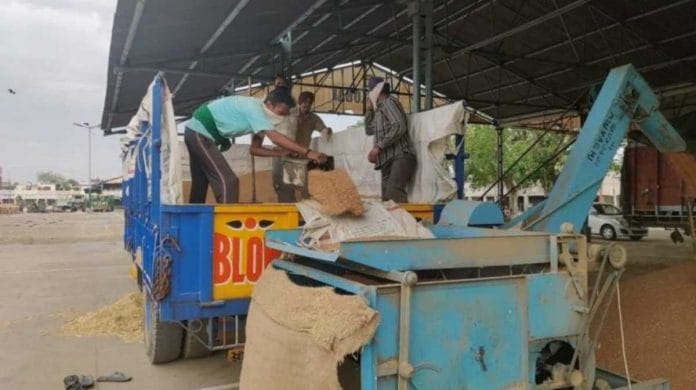Chandigarh: The vehement protests by farmers in Punjab and Haryana over the past few weeks against the central government’s three farm Bills have brought into focus the role of middlemen.
Prime Minister Narendra Modi has said these middlemen “loot the profit of the farmers”, and the government as well as agriculture experts have concurred that the bills will free the farmers from their shackles.
Arhatiyas, as they are called in Punjab and Haryana, are commission agents. They have been in business for around six decades, since the passage of Agricultural Produce Markets Act, 1961. Over the years, arhatiyas have come to dominate the agriculture marketing and credit system, and even command substantial political and social clout.
Middlemen or facilitators?
Under the 1961 Act, the government notifies a particular area as a mandi (market), where farmers sell their produce through arhatiyas registered under the act. Arhatiyas have shops inside the mandis where the farmers bring their produce, and once they procure the produce, arhatiyas sell them through open auction.
There are 1,858 mandis in Punjab and 400 in Haryana. More than 23,600 arhatiyas are registered in Punjab and 22,000 in Haryana.
The arhatiyas’ commission is fixed by the government at 2.5 per cent of the purchase price. Both the arhatiyas’ commission and the mandi fee, which goes to the government, are paid by the buyers. In Punjab, the fee-plus-commission is 8.5 per cent, while in Haryana, it is 6.5 per cent.
However, not everyone agrees that arhatiyas are to blame for the farmers’ plight.
“Arhatiyas are not middlemen. They facilitate the sale of the farmers’ produce for a commission from the buyers. Middlemen are those who buy a crop at, say, Rs 100 from us and sell it at Rs 200 to someone, making money in the middle,” said Balbir Singh Rajewal, president of the Bharatiya Kisan Union (Rajewal).
Also read: Modi’s farm bills gamble is risky, but it was about time and is still worth it
Govt’s dependence on arhatiyas
The government procures the biggest share of agricultural produce, be it of wheat or paddy, from mandis. The farmers’ produce is sold to the government at the minimum support price (MSP), and the scale of this operation is huge — this year from Punjab, the Food Corporation of India has procured 127 lakh metric tonnes of wheat worth Rs 30,000 crore.
Since procurement translates into assured payments to the farmers, smooth procurement becomes imperative. The government depends heavily on arhatiyas for this.
“We unload the produce, clean it and weigh it, fill it in bags and ready it for transportation. We arrange the labour and cartage. We ensure the system runs like a well-oiled machine,” said Ashok Gupta, president of the Haryana Arhatiya Association.
“In states where there is no mandi system, farmers are suffering and the new bills intend to end the mandi system there as well. The corporates whom these bills benefit will also need us to help them purchase crops, but let them operate through the mandis,” Gupta added.
Also read: ‘Save farmers’ — Punjabi artistes Diljit Dosanjh, Sargun Mehta, Jazzy B oppose agri bills
‘Exploitative’ system
The dependence of the farmers on arhatiyas, however, goes beyond just the sale of crops.
“Arhatiyas are a source of easy and readily available loans. Farmers need advance (money) for purchasing seeds, fertilisers etc. during the sowing season, as also for domestic needs like marriages, buying vehicles etc,” said Satish Verma, head of the RBI Chair at the Centre for Research in Rural and Industrial Development (CRRID), Chandigarh. “The rate of interest is as high as 18 per cent, compounded twice a year. The system is exploitative.”
Sucha Singh Gill, senior professor at CRRID, added: “Till banks start giving loans to farmers for daily needs, arhatiyas cannot be eradicated. Farmers get paid for their crops twice a year while they need money everyday.”
Verma said in the farmers’ ongoing protests, the mandi system has been projected as a successful model of agricultural marketing. “But arhatiyas have not been successful in discovering good prices for farmers for ‘non-procurement, non-MSP’ crops. Crops whose MSP has been fixed are also sold at lower prices,” he said.
Experts also say that the dependence of farmers on arhatiyas encourages malpractices as they are sometimes paid less than what the arhatiyas sold their crops for.
“Some arhatiyas have taken to rice shelling, leading to a clash of interest. How can they give a good price to the farmer if they are themselves the purchasers of the produce?” asked Verma.
Arhatiyas, however, strongly contest these claims.
“Even for wheat and paddy, which are procured at MSP, we try to get higher rates from private companies. The crop rejected by the government as substandard too has to be sold. MSP crops, which are not procured, are sold at MSP or higher rates,” said Vijay Kalra, president of the Federation of Arhatiya Association of Punjab.
Haryana’s Gupta added: “The farmer is not the illiterate novice that one thinks of. The new generation is educated and knows the market rates.”
Also read: How Modi govt’s 3 contentious farm bills have exposed SAD, Congress & BJP’s hypocrisy






